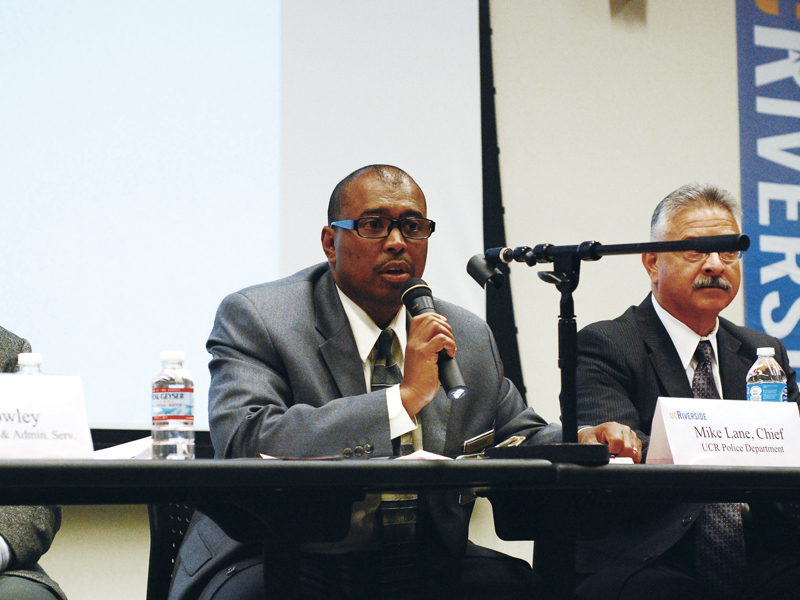
Interim Chancellor Jane Close Conoley and members of both the UC Police Department (UCPD) and Riverside Police Department (RPD) addressed a crowd of concerned students and residents April 4 during the Chancellor’s Town Hall meeting on campus safety. The town hall included possible suggestions to combat recent spikes in crime through increased police patrols, 24-hour bike patrols on campus, new public awareness efforts and other methods.
Panelists included the newly-formed UCR Task Force on Campus Safety, Lieutenant Andy Flores of the RPD, UCR Police Chief Mike Lane and Associate Vice Chancellor Charles Rowley. The task force was formed in response to the 13 robberies that have occurred since January. Coincidentally, another robbery was reported just hours after the town hall meeting when a woman’s phone was stripped out of her hands at the Starbuck’s coffee shop located off University Avenue in the University Village shopping center.
Following an outline for methods of crime prevention, the panelists proceeded to a public forum which allowed the audience to ask questions, state concerns and offer suggestions.
Feedback from the community included encouragement of increased visibility of the UCPD headquarters. Louis Vandenberg of KUCR stated that, “It’s kind of incredible that here is our campus police station right there where all this crime is occurring. I think it’s because the criminals don’t realize that it’s a police station.”
Public suggestions included increasing the number of blue call boxes and self-defense training classes for men and women.
However, there was a large concern for racial profiling and harassment expressed by several students who had experienced unsettling encounters with the Riverside police.
Graduate student in the school of education Aaron Jones, graduate student of political science Jerry Robertson, graduate student of African studies Philip Carroll-Johnson, and fourth-year sociology major James Garrett all spoke about how they had been frequently stopped by the police without proper cause.
Jones reminded the panel, “Let’s not forget about the large population of African-American students on campus and not to adversely affect their experience on campus.”
Carroll-Johnson recalled being stopped three times over the course of spring break. He also vented his frustration at the crime reports that are emailed to students and how they focus on race.
In an interview after the town hall meeting, Carroll-Johnson elaborated on his thoughts. “We have to ask ourselves, at what cost are we paying for the safety of our student body? We cannot racially target students, or any individual for that matter, in our initiatives to make our community safer. This includes the UCPD Crime reports… UCPD’s racialized descriptions of the men do nothing more than to reinforce notions of the black male body as criminal and instill a culture of fear, ignorance, and intolerance in non-black students.”
In response to these men’s stories, Mike Davis stated that he would open up dialogue with these students and further action could be taken from there. “I think it’s extremely important for me to reach out personally… I’ll get in touch with African Student Programs and we’ll develop a dialogue,” stated Davis.
Chancellor Conoley also gave her reaction, stating, “I think a couple brand new ideas came through—very importantly, the perspective of our African-American students with their concerns about profiling. That really hit us close to our hearts. Vice Chancellor [Jim] Sandoval is already making plans to request one of these students or others from the African [Student] Programs might take part in the task force try to raise our sensitivity on how to avoid that. This is a kind of terrible collateral damage issue when we’re trying to put police out there in the name of safety and in fact it creating fear on the part of our students is absolutely unacceptable.”
She shared other ideas that stood out to her such as the call box issue and using people in student affairs to provide in leadership for safety and awareness. “Each of these efforts come with some cost,” said Chancellor Conoley. “As a chancellor I was thinking about how much they cost in dollars… but I can see there is a psychological, emotional and personal safety cost associated with it too… The easy part is to get a good idea and ‘yeah, we’ll do our best to run with that.’ The hard part is how to run with things and not cause unintended consequences.”








